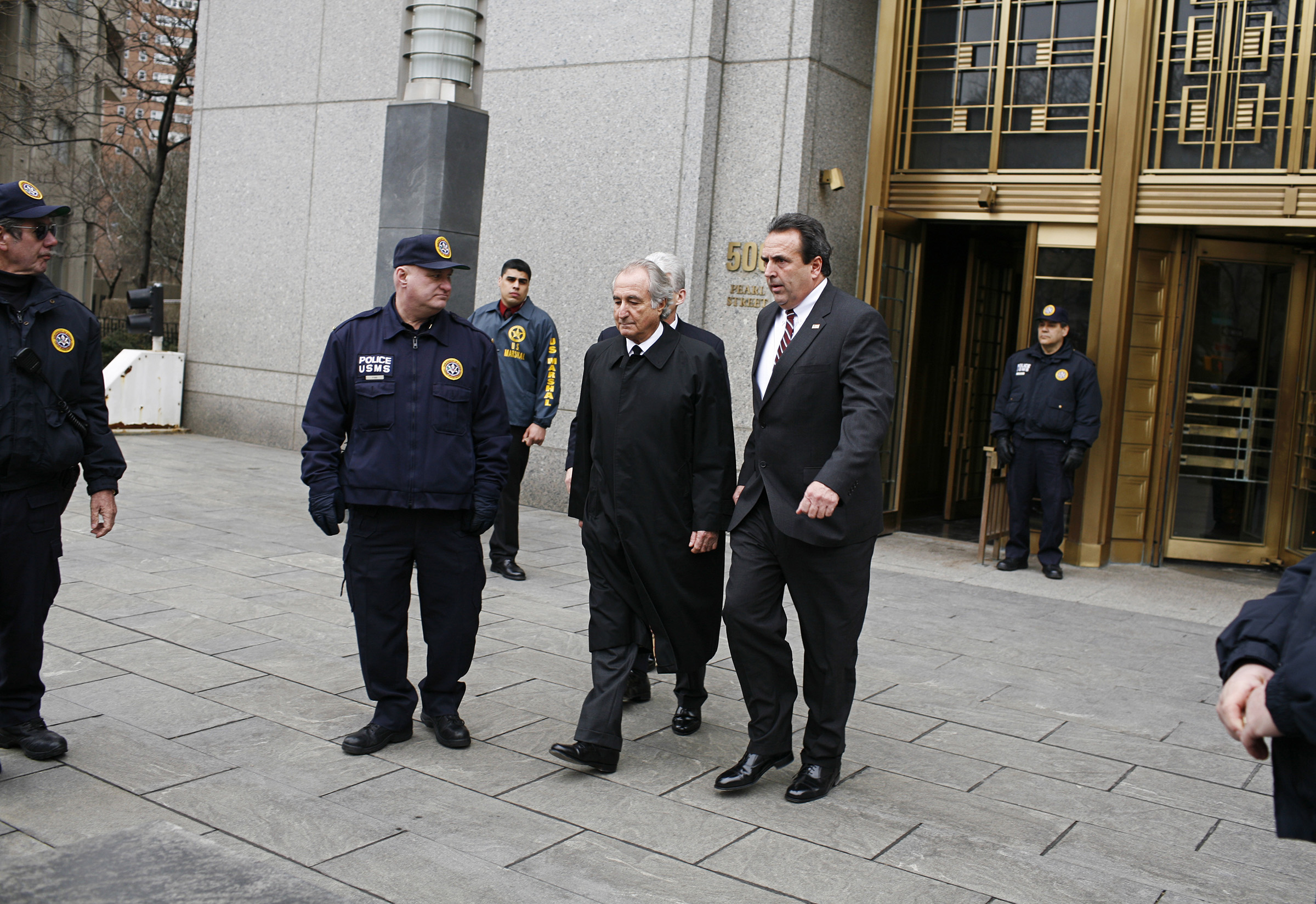Bernard L. Madoff, a boy from Queens who went on to perpetrate one of the most infamous frauds in Wall Street history, died Wednesday in a federal prison, according to multiple reports. He was 82.
In a February 2020 court filing, Madoff said he was entering the final stages of kidney disease and asked for an early prison release, which was not granted.
Madoff, a financier who began his career in the 1960s, was the reason that generations of Americans learned about the elaborate hoax known as a Ponzi scheme, which involves paying early investors with the funds from later investors, while portraying those payments as actual profits. Madoff’s operation ultimately dwarfed the one Charles Ponzi himself orchestrated circa 1920 and is believed to be the largest in history.
Madoff’s scheme yielded an estimated $65 billion in losses by the time the façade crumbled amid the global financial crisis of 2008. Among his more than 37,000 victims, spanning at least 120 countries, were wealthy friends and public figures including New York Mets owner Fred Wilpon and director Steven Spielberg. Also caught in his web were charitable organizations including the Elie Wiesel Foundation for Humanity, universities and ordinary people who were sapped of their savings and, in at least one case, reduced to trawling for food in trash cans.
“He discarded me like roadkill,” then-65-year-old Miriam Siegman said of Madoff during legal proceedings, explaining how her losses had led her to living on food stamps and scavenging garbage. “The man who did this had deep contempt for his victims.”
Known more familiarly as Bernie, Madoff was born in Queens in 1938 and raised in Laurelton, a middle-class and predominantly Jewish neighborhood. He was the grandson of immigrants on both sides of his family. After high school, Madoff earned a degree in political science from Hofstra University in Hempstead, N.Y., and then briefly studied law before founding his investment firm, Bernard L. Madoff Investment Securities, in 1960. The funds he used to do it included money he had earned working as a lifeguard.
Madoff got his start in the financial world doing legitimate work with inexpensive “penny” stocks, acting as a go-between for buyers and sellers. Over the years he moved toward tonier trades and bigger deals, developing relationships with government regulators along the way. In the early 1990s, Madoff served three one-year terms as the director of NASDAQ. It is believed that his Ponzi scheme had begun by this time.
The financial crisis brought Madoff’s investors calling for money that he and his firm did not have, reportedly driving him to reveal the scheme to family members before investigations by the FBI and other agencies followed. He was arrested in late 2008, and the following year pleaded guilty to 11 felony counts, including securities fraud, money laundering and false filings with the U.S. Securities and Exchange Commission. The judge in his case described his actions as “extraordinary evil” and sentenced him to 150 years in prison.

Stricken with kidney disease, Madoff sought compassionate release in February 2020, based on medical documents that showed he had an estimated 18 months to live. In an interview with the Washington Post, he expressed remorse for his crimes, noting that he had cooperated with authorities to help recoup money for his victims. “I’ve served 11 years already, and, quite frankly, I’ve suffered through it,” he said at the time.
Madoff is survived by his wife, Ruth, who co-founded the small firm named for her husband in 1960 but was never charged in the scheme. Madoff’s two sons, who also worked at the firm but were never charged, precede him. Andrew Madoff, the younger, died of cancer in 2014. Mark Madoff committed suicide in 2010, on the second anniversary of his father’s arrest.
“His investors called him a ‘genius.’ But, proving correct that old adage from the country and western song, you never really know what goes on behind closed doors,” documentary filmmaker Michael Moore wrote of Madoff in 2009, as the economy yawed.
There remain are a lot of closed doors in the financial system. Though investigators eventually put numbers on the size of his swindle, the distrust that Bernard L. Madoff inspired in the complex, exclusionary machinations of Wall Street remains an incalculable legacy.
More Must-Reads From TIME
- The 100 Most Influential People of 2024
- Coco Gauff Is Playing for Herself Now
- Scenes From Pro-Palestinian Encampments Across U.S. Universities
- 6 Compliments That Land Every Time
- If You're Dating Right Now , You're Brave: Column
- The AI That Could Heal a Divided Internet
- Fallout Is a Brilliant Model for the Future of Video Game Adaptations
- Want Weekly Recs on What to Watch, Read, and More? Sign Up for Worth Your Time
Contact us at letters@time.com